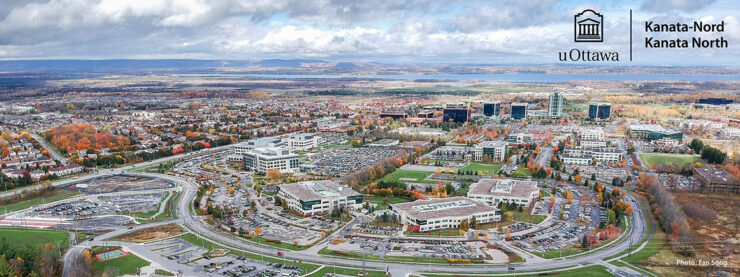Experts agree Canada should be playing a larger role in space
Humans will eventually live on the moon—that’s just the view of nine Canadian astronauts, anyway.
On Sept. 21, the U of O hosted astronauts Chris Hadfield, Dave Williams, Marc Garneau, Steve MacLean, Robert Thirsk, Bjnari Tryggvason, Jeremy Hansen, Joshua Kutryk, and Jenni Sidey-Gibbons for a fireside chat. The group touched on topics such as Artificial Intelligence (AI), asteroids, and walking on the moon with television host Amber Mac.
Organized by the Canadian Space Agency (CSA), the fireside chat was held in U of O’s Desmarais building, where students and members of the general public waited in line for over an hour to attend.
“We’re at a tipping point, with so many other countries and space agencies categorically saying we are going to start permanently living around and settling on the surface of the moon,” said Hadfield, Canada’s first astronaut to walk in space. “It’s a great opportunity for Canada.”
When asked what the industry can do to involve students in the development of the space sector, Williams said that all astronauts were once in the same place as students.
“I didn’t think I was ever going to become an astronaut, so what I learned in the process is it’s all about persistence, resilience, and having relentless optimism.”
Hadfield continued with the importance of “letting schools (and) students see, whether high-school or younger, that this is part of the fabric of Canadian opportunity.”
Canada has been criticized in the past for lacking space funding, which puts the industry at risk of losing talent, including new graduates, to other countries.
MacLean said Canada may have an opportunity to take a leadership role on the proposed Lunar Orbital Platform-Gateway, which would be designed for deep space exploration including missions to Mars.
“If we can play that leadership role on the external robotics and the internal robotics on the Gateway project, you’ll see that we’ll be able to showcase what we know,” he said.
“What we know is robotics, expert systems, AI associated with robotics, and we are so good at that, we would be a natural leader to take that on.”
In closing, Mac asked how tension between countries can be overcome through collaborative space projects. The astronauts were in agreement—solving a common problem unites people.
Thirsk continued and said citizenship is insignificant in space.
“Every human being needs to go to space for three days and just look out the window,” he said.
By the end of 2018, Canada will be working on the Origins, Spectral Interpretation, Resource Identification, Security, Regolith Explorer (OSIRIS-REx), an asteroid and sample-return system. Canada has also contributed the Light Detection and Ranging sensor on OSIRIS-REx, which allows for 3D-mapping of the asteroid Bennu.
As well, in December 2018, Canadian astronaut David Saint-Jacques will begin his first mission in space—a six-month operation to test technology and carry-out robotic tasks.
A webcast of the fireside chat can be viewed on the CSA Facebook page here.





